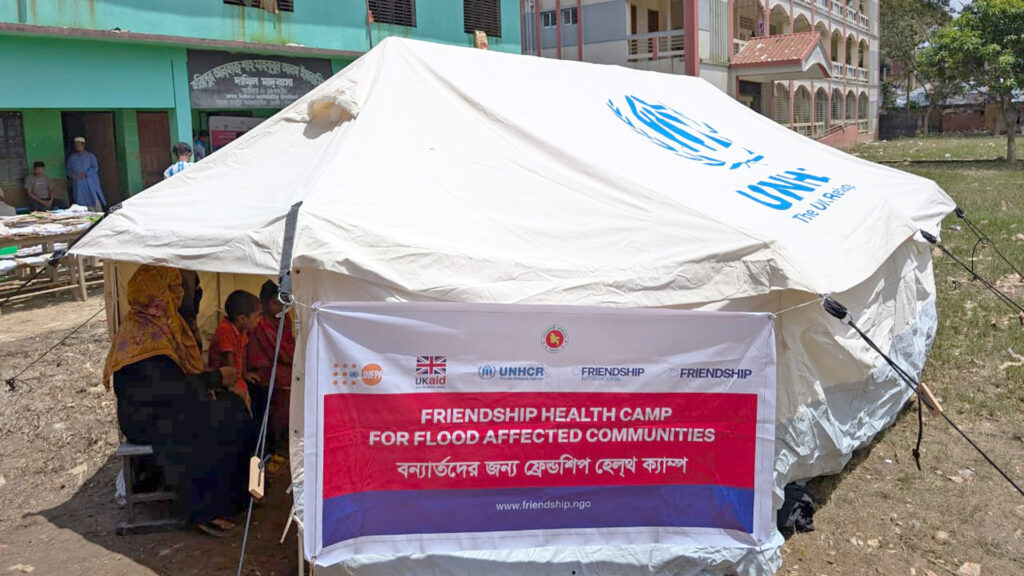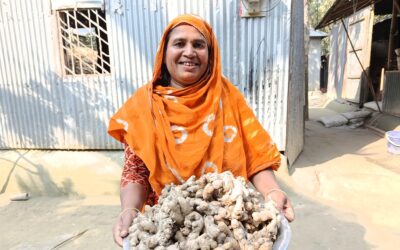
by Friendship News Desk,
September 5, 2024
Several districts in Eastern Bangladesh have been inundated due to deadly flash floods this August, leaving millions at an unprecedented loss. Friendship has been addressing the needs of the flood victims through urgent relief and rehabilitation support.
Bangladesh has been dealing with two devastating floods back-to-back within two months. Just as the situation from the previous flood was slightly improving, another flood struck the eastern districts of Bangladesh unexpectedly on 21 August at midnight. It immediately left families stranded, affecting nearly 5.7 million people, and 23 people died according to the Flood Forecasting and Warning Centre Bangladesh. The floods have caused severe damage to homes, infrastructure, and livelihoods.
Extent of Destruction
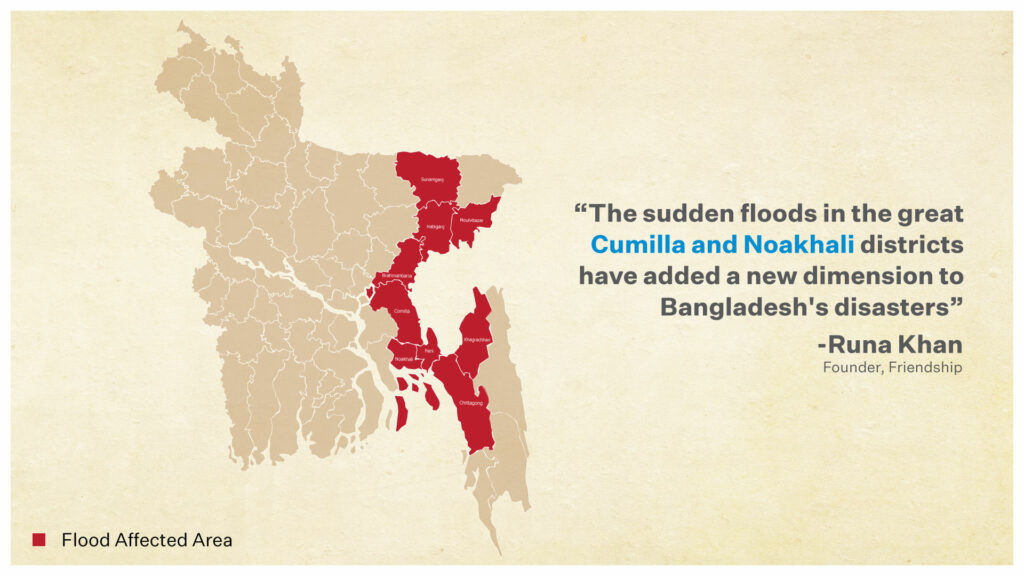
On 21 August heavy rainfall and upstream water from India immediately unleashed the flood onto the cities of Feni, Noakhali and Cumilla. A flood like this never happened in this region for more than 30 years. The people of Bangladesh showed great unity in providing relief and rescue operations along with the Bangladesh government. More coordinated, long-term relief is needed in these areas since relief distribution has been relatively unequal.
Abdul Goni, a public school employee from Uttar Gabtoli village, Parshuram subdistrict in Feni, is one of the many victims displaced by the flood. The flood engulfed his home in a matter of minutes. At chest-level water, he and his family became isolated in the water and completely helpless. For seven days, there was no electricity or internet. “I had to swim around most of the time looking for help or carrying others to safety. There was no food for so many days, just thinking of it makes me teary. My crops, my farmlands are all destroyed. I am at a complete loss,” Abdul Goni despaired.

Friendship’s Interventions
Friendship holds a unique but vast experience in managing floods and flood-affected people, developed from 22 years of tested interventions. The organisation prioritised marginalised areas and isolated families with no access to relief in the most inaccessible of the affected areas.
Water purification unit: A mobile water purification unit has been deployed to ensure safe drinking water in the flood-affected areas of eastern Bangladesh—Daudkandi and Burichang in Comilla and Pashuram and Chhagalnaiya in Feni. During times of flood, even though there is water everywhere, most of it is extremely unsafe to drink and is a vector for water-borne diseases. The filtration unit purifies water even in the most remote areas, and can provide drinkable water at a fraction of the cost of bottled water without the need for single-uses plastics. Furthermore, bottled water would also be difficult to transport to the communities, as markets and shops are inundated as well.
Consequently, providing water that is not filled with sand, debris, trash, pollution, and dead animal carcasses is an immediate concern. As such, the water purification system installed by Friendship can process 500 litres per hour and has thus far provided 11,000 litres of drinking water. Of note is that as a consequence, people do not have to find places to buy drinking water, with many markets and shops submerged, filter their own—much less drink contaminated water, or use plastic bottles to further exacerbate the pollution.
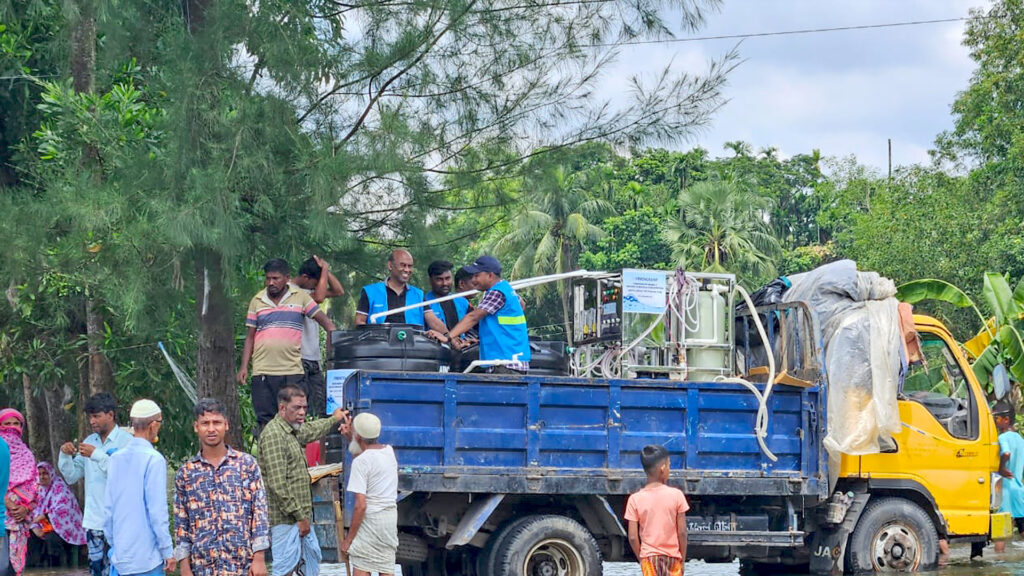
Medical intervention: Special emphasis is being placed on emergency treatment for waterborne diseases like diarrhoea or skin infections, as well as healthcare for pregnant women, adolescent girls, and elderly women. 100-120 patients are being treated each day, with about 55% of them being women. Friendship is working on a plan to provide healthcare in 16 locations over 8 days, covering two locations daily. This plan will bring over 40,000 local residents under healthcare coverage in Cumilla and Feni.
Outreach teams provide essential household care, including antenatal and postnatal check-ups, contraceptive services, and reproductive health counselling in these areas that have been cut off from access by flood waters. From September 1st to 9th, static health camps will offer services like triage and registration, women’s health check-ups for both reproductive-age women and those over 45, male consultations, medicine dispensing, and healthcare counselling to support ongoing health management.
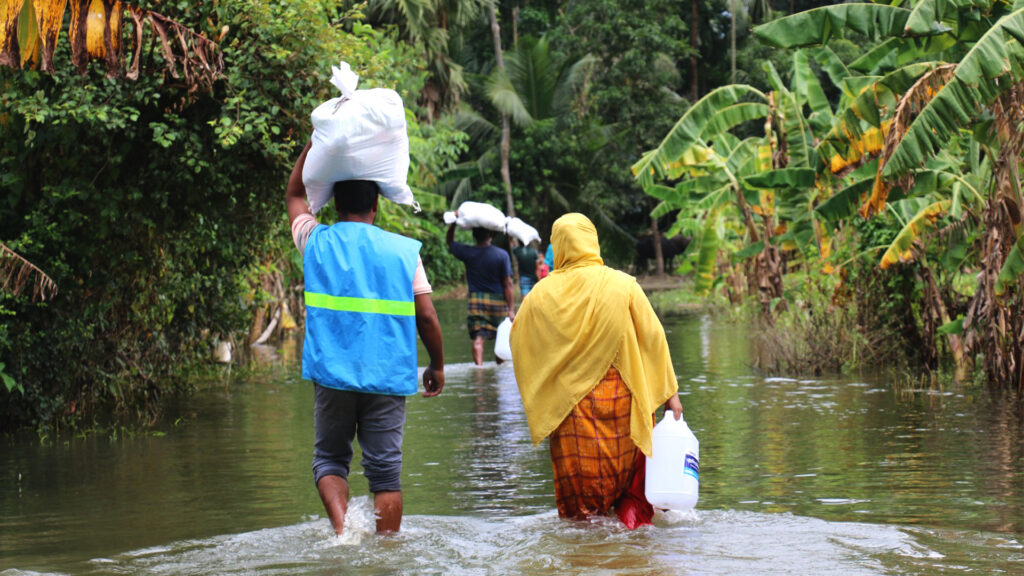
Distribution of essentials: 10 days’ worth of food and hygiene kits have been supplied to 1000 families. One relief packet includes 10 kg rice, 2 kg pulses, 2 litres of cooking oil, 1 kg of salt, 1 kg of sugar, 500g of flattened rice, 500g of semolina, 1 packet of sanitary napkins, 2 bars of detergent, 1 bar of soap and 5 packets of saline.
Solar power provision: 4 solar power stations have been set up to provide emergency electricity in the flood-affected areas. People can charge their phones to contact loved ones or coordinate with emergency services, use appliances and have some degree of comfort.
In addition to these immediate relief and healthcare services in Feni and Cumilla, two of the most flooded areas, Friendship initiated a GlobalGiving campaign, through which anyone can contribute to help the victims.
With the support of the United Nations High Commissioner for Refugees (UNHCR) and the United Nations Population Fund (UNFPA), Friendship volunteers and trained field staff have been working on critical flood interventions in Feni and Comilla. All relief efforts are being coordinated with the local government authorities and Bangladesh Army.
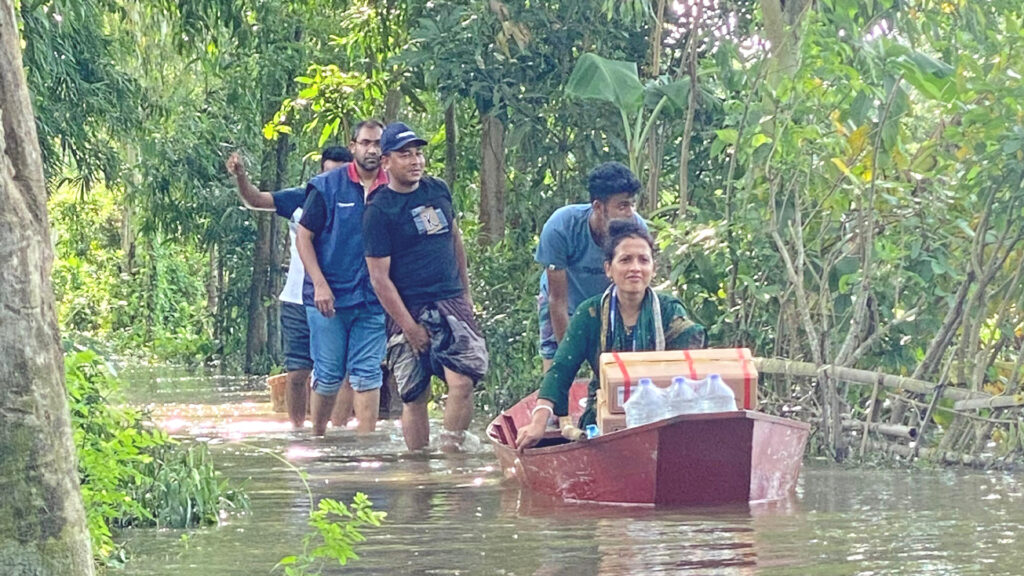
Runa Khan, founder of Friendship stated that the sudden floods in the great Cumilla and Noakhali regions have added a new dimension to Bangladesh’s disasters. She said, “Flash floods of this level are unprecedented. The calamity caused is heartbreaking. Local residents could never anticipate such a deluge. The residents of nine districts in the Sylhet, Cumilla, and Noakhali regions are still facing enormous difficulties for survival. High population density has led to a great number of people being affected. Friendship has always worked on the frontlines with remote communities. Our preparedness goes beyond working in a particular region and thus acts as a multiplier. For example, our flood volunteers, trained over years in the northern chars—never frightened of water or rivers in spate—promptly reached the most inaccessible areas with 7-day family packages, initiated emergency healthcare, and provided fresh drinking water through emergency measures.”
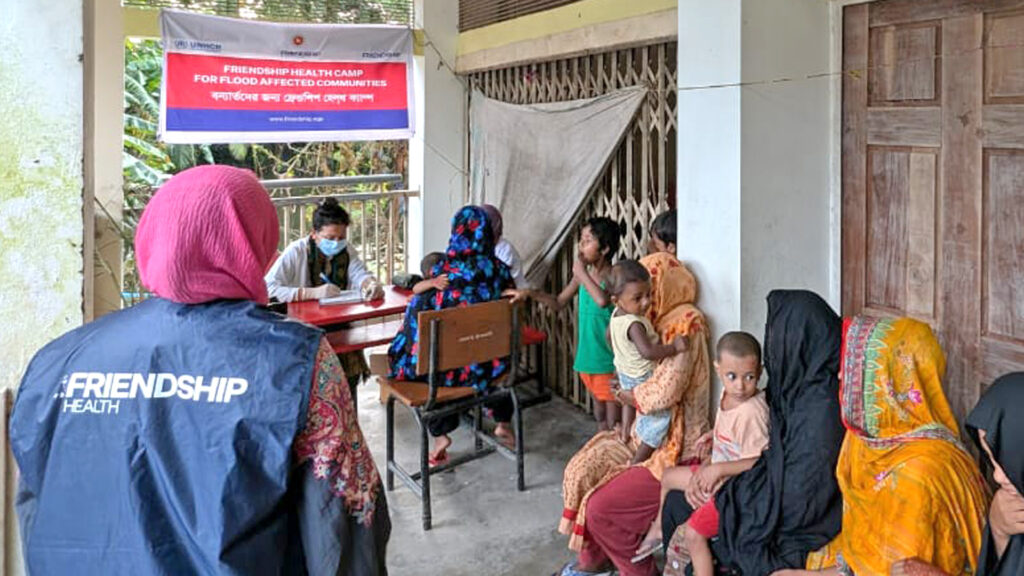
The latter said, “It costs only Tk0.59 to purify a litre of water with our mobile water purification system as opposed to many times that for a litre of bottled water. It is both economically and environmentally sustainable. The purification system allows to provision of fresh water to even the most remote locations. The locals were pleasantly surprised by our innovative approach and they could observe the purification process with their own eyes. For days, people were surrounded by water which they could not drink, but the mobile water plant worked like magic and turned that very same water into clean, pure water. The water purification system’s mobility significantly reduces logistical constraints and lets us adapt to environmental challenges more effectively.”
Friendship’s senior director of Climate Action, Kazi Amdadul Hoque and deputy director of Health, Dr. Rafi Abul Hasnat Siddique have been leading the organisation’s relief and healthcare interventions in Feni and Cumilla.
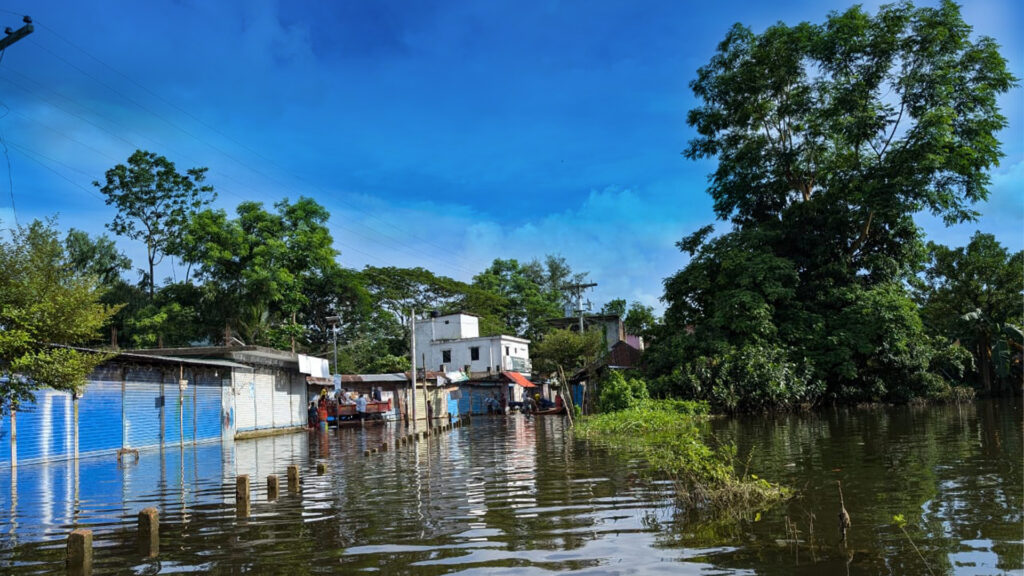
Crowdfunding Assistance
Friendship has been serving the flood victims for more than a week, but more needs to be done. Every little bit of assistance is essential. Friendship’s GlobalGiving campaign has a goal of attaining USD 10,000 in funds. The funds will be used to distribute food and hygiene kits to 52,000 people, construct and operate 8 mobile water purification units, distribute 250 emergency solar kits, and establish medical camps which will assist a further 30,000 people.
Support Friendship’s relief efforts. Donate now at GlobalGiving, or our website on the top right corner. Readers in Bangladesh may also use the bKash, Nagad or UPay mobile wallet apps.
